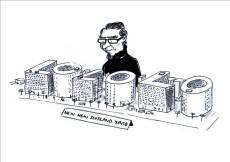October 14, 2013
AHMM chosen for new Met Police headquarters project
The firm of architects chosen for Google’s enormous new North London headquarters project as well as the redevelopment of the BBC’s Television Centre has been chosen to design the new home of the Metropolitan Police in Whitehall. The decision to award the job to Allford Hall Monaghan Morris (AHMM) was announced by the Mayor of London, the Metropolitan Police Commissioner and the Royal Institute of British Architects (RIBA). The Mayor’s Office for Policing And Crime (MOPAC) is selling New Scotland Yard, and moving to modern offices at the iconic Curtis Green building on the Victoria Embankment in 2015. This new building will then revert to being called Scotland Yard.
























October 22, 2013
Germans prove that long hours and productivity are often two completely different things
by John Sacks • Comment, Workplace
More →